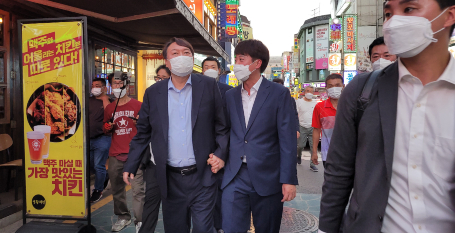Yoon Suk-yeol, a conservative former prosecutor, declared victory in South Korea’s presidential election on Thursday after his liberal rival conceded defeat following a bitter battle in the politically divided nation.
Yoon, from the main opposition People Power Party, edged out the ruling Democratic Party’s Lee Jae-myung with 48.6% of the vote to 47.8%, with more than 98% of the ballots counted as of 4.20am on Thursday (7.20pm GMT on Wednesday).
“This is a victory of the great South Korean people,” Yoon told cheering supporters, who were chanting his name at the country’s National Assembly.
He later pledged to honour the constitution and parliament and work with opposition parties to heal polarised politics and foster unity, calling the election a “victory of the great people”.
“Our competition is over for now,” he told a news conference, thanking and consoling Lee and other rivals. “We have to join hands and unite into one for the people and the country.”
Lee conceded defeat and congratulated his opponent.
Opposition presidential candidate campaigns in Busan<br>epa09809152 Yoon Suk-yeol, the presidential candidate of the main opposition People Power Party, waves toward his supporters during a campaign stop in Busan, Soouth Korea, 08 March 2022, one day ahead of the presidential election. EPA/YONHAP / POOL SOUTH KOREA OUT
Shamans, Hitler and mutual hatred: South Koreans go to polls in rancorous election
Read more
“I did my best, but failed to live up to your expectations,” he told a news conference, blaming his “shortcomings”.
“The president-elect, I desperately ask you to overcome divisions and conflicts and open an era of integration and unity.”
The White House congratulated Yoon and said President Joe Biden said he looked forward to working closely with him to expand close cooperation between the allies.
Advertisement
“The alliance between the United States and the Republic of Korea, our economies and our people is ironclad. President Biden looks forward to continue working with the new president-elect to further expand our close cooperation,” a spokesperson said.
The unusually bitter election campaign was marred by scandals and smears, but the policy stakes are high for the country of 52 million.
About 77% of South Korea’s 44 million eligible voters cast ballots to pick the leader of a nation whose global status is rising even as it has been riven by gender and generational divisions, while facing a confrontational North Korea.
In echoes of the 2020 national assembly elections, voters wore masks and used hand sanitiser, casting their ballots on the same day South Korea reported a record 342,446 new Covid-19 cases.
More than a million people are isolating at home after testing positive, health authorities say. The country amended its electoral laws last month to ensure they would be able to vote.
Yoon, who was hoping to benefit from public anger over rising house prices in Seoul, income inequality and youth unemployment, said during the campaign that he would address mounting economic problems with a dose of fiscal conservatism, including a cut in the minimum wage and the removal of limits on working hours.
As an avowed “anti-feminist” he has pledged to abolish the ministry for gender equality, claiming South Korean women do not suffer systemic discrimination - despite voluminous evidence to the contrary.
He vowed to address the housing crisis with tax relief, pledged support for small businesses and self-employed people, and encouraged the private sector to create jobs and builds millions of new homes.
While North Korea’s recent return to ballistic missile tests was lower down the list of voter priorities, Yoon’s team has said he would restart talks with the regime in Pyongyang, while boosting South Korea’s deterrent capabilities.
That could include buying an additional US missile defence system, despite criticism from China that its powerful radar can penetrate its territory. South Korea’s decision to deploy the system, known as Thaad, in 2017 triggered economic retaliation from Beijing.
Yoon Suk-yeol, a conservative former prosecutor, has declared victory in South Korea’s presidential election after his main rival conceded defeat with 98% of votes counted.
Yoon leads the People Power Party and has taken control of the presidency from the Democratic Party, led by Lee Jae-myung.
The election has highlighted sharp divisions within South Korea, with the win by Yoon marking a narrow victory for conservative factions within the country.
Divisions appear to generally appear along generational lines, with younger voters seeking to build a more liberal society, while older generations favour a more socially conservative outlook.
For LGBTQ people, the result appears to be disappointing. Comprehensive anti-discrimination provisions appear to be top of the wish-list for South Korea's LGBTQ community - that seems less likely to happen in a country led by Yoon.
Yoon has described himself as anti-feminist and has pledged to abolish the ministry for gender equality.
What’s life like for LGBTQ people in South Korea?
What’s life like for LGBTQ people in South Korea? Let’s take a look at some of the key equality indicators.
Is homosexuality legal in South Korea?
Yes. While same-sex encounters have never technically been illegal in South Korea, 2003 was a big step forward when homosexuality was officially declassified as “harmful and obscene”.
Are there anti-discrimination protections in place for LGBTQ people in South Korea?
While there are some protections in place at a local government level, national anti-discrimination legislation does not protect people from discrimination on the basis of sexuality or gender identity.
Is there marriage equality?
There is no legal recognition of same-sex relationships and no marriage equality.
What’s life like for LGBTQ people in South Korea?
South Korea is a socially conservative country. There remains a strong expectation that people conform to the norms of family and society.
Homosexuality is seen as a taboo subject.












 打印版本
打印版本




















读者回应
抢先发表第一个回应吧!
请先登入再使用此功能。